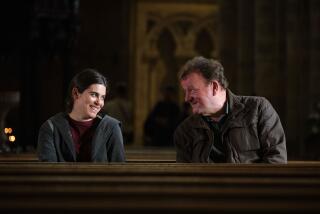THEATER REVIEW : Spirited Writing Can’t Keep ‘Loco Motives’ on Track : Nicholas Meyer’s muscular script looks at the last days of Leo Tolstoy, focusing on his struggle between all-consuming religious devotion and family.
Aside from the jocular word play in the title, Nicholas Meyer’s “Loco Motives,” directed by him on Stage 10 of the Culver Studios lot, is a serious look at the forces that governed the life of Russia’s Leo Nikolaevich Tolstoy.
Count Tolstoy, author of “Anna Karenina” and “War and Peace” (in a sea of other works), was a man torn by his love of writing and his devotion to a Christian ethic that increasingly took over his life. By the time he died at 82, in a bleak railroad station in the small village of Astapovo in November, 1910, the preoccupation with Christian doctrine had become all-consuming.
It had sundered his marriage and ripped the family apart. Tolstoy was on his way to nowhere when he died, in unfocused pursuit of some vague peace and quiet. The countess, his wife, was not only barred from visiting his deathbed, but had been subjected to increasingly erratic behavior on his part as, more and more, he became governed by religious obsession.
Is this the stuff that drama’s made of? Rarely. It is the stuff writers find irresistible. The challenge then for any dramatist becomes how to make so much theatricality in life theatrical on stage, without letting drama turn to melodrama or the play settle for being simply a retelling of events--something movies do better.
“Loco Motives” never becomes melodrama, but neither does Meyer escape the trap entirely. He’s an experienced and pungent writer whose script, line for line, is muscular and full of aphoristic gems.
But he doesn’t altogether succeed in placing the facts in some larger context. He refrains from judging who or what was right or wrong, when a point of view might have given the piece just the needed perspective it lacks: art vs. philosophy; the gap between religion’s professed concern for humanity and the harm wreaked on his immediate family; or the contradiction in a man who vigorously refuted the zeal with which Shakespeare’s King Lear gave away his kingdom, but then turned around and gave away his own land.
Meyer’s script, which only slightly distorts the facts (Tolstoy was accompanied on his final journey by his youngest daughter, not the servant Grisha, nicely played here by Michael Cavenaugh), sticks to the story without encouraging much broader reflection.
Director Meyer picked well when he chose William Atherton for the Tolstoy role. This fiery, intelligent actor brings the right brusqueness and intellectual ferocity to the younger Leo, and a faint sense of having lost his mind to the older, vaguer, proud one. There is something of Peter O’Toole’s Lawrence of Arabia in this performance--a charismatic arrogance that makes young women swoon.
It certainly makes Laurie Walters’ appealing Sonia Bers eager to follow him anywhere, become the mother of his myriad children and remain slavishly, even possessively devoted to his success. This lasted until her growing rapacity and his growing religious zeal, including intrusive disciples, put a fatal wedge in the marriage.
But there is another, structural problem with “Loco Motives.” After the opener--the moment of Tolstoy’s descent from the train at Astapovo--nearly every other scene is a flashback.
Even under ideal technological conditions, this would make for a choppy play. On Soundstage 10, where the rudimentary setup means moving furniture by hand, the back-and-forthness keeps interrupting the action. (Wisely, and acceptably, neither Atherton nor the other actors attempt any change in their age from one scene to the next.)
Farid Tamjidi designed the efficiency railroad station and Erica L. Bobrow has provided appropriate lighting effects to give an illusion of passing trains from the lugubrious waiting room. Tanya Gill’s costumes are on the money, especially the one for the gypsy Katia (a lissome Kathryn Cressida). But they do not solve the fundamental problem of too many scene changes in too little time.
Meyer, whose film “Time After Time” and whose novel and film “Seven-Percent Solution” proved so intriguing, has stated publicly that he did not have a screenplay in mind when he wrote “Loco Motives.” There is no reason to doubt it, which does not take away from the fact that “Loco Motives” might, in fact, work better as a movie, not only because film is more adept at flashbacks, but also because the medium can settle for a thumping good story in a way that theater won’t.
Meanwhile, Meyer is hardly alone in thinking that Tolstoy, and in particular the circumstances of his death, are fit dramatic subjects. Both playwrights Donald Freed and Leon Katz have made passes at the same event, and Jay Parini’s novel on the subject, “The Last Station,” may become a film.
Loco Motives,” Culver Studios, Soundstage No. 10, 9336 W. Washington Blvd., Culver City. Thursdays-Sundays, 8 p.m. Ends April 18. $20; (213) 660-8587. Running time: 2 hours, 30 minutes.
Drake Retires, Takes New Title
Los Angeles Times Theater Critic Sylvie Drake is retiring and assuming the new title Times Theater Critic Emeritus on Thursday. She will continue to review theater for the Calendar section on a regular basis.
Drake joined the newspaper’s staff in 1971 and was named theater writer in 1985. Since March, 1991, she has served as theater critic and directed theater review coverage for the newspaper.
More to Read
The biggest entertainment stories
Get our big stories about Hollywood, film, television, music, arts, culture and more right in your inbox as soon as they publish.
You may occasionally receive promotional content from the Los Angeles Times.










